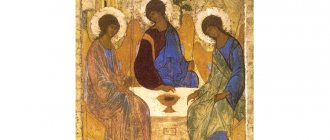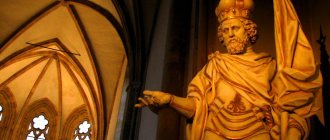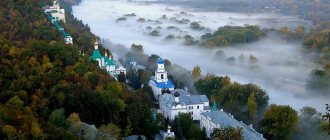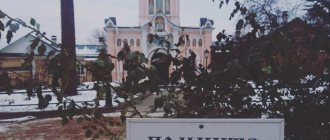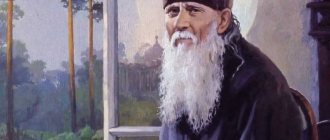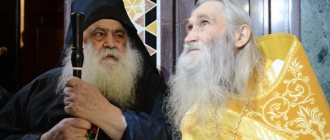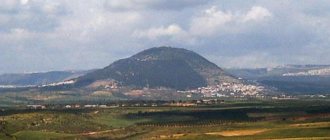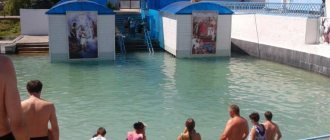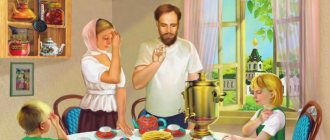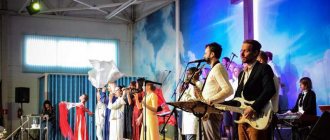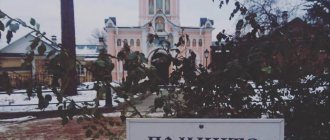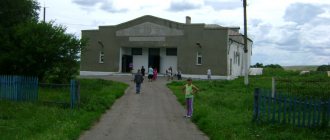From time immemorial, Orthodox Christians believed in the supreme purpose of the Russian state, as the successor of Byzantium, the keeper of the true faith, peace and the main support of Christians.
Western sectarians do not agree with this: they believe that the notorious “Gog and Magog in the “Revelation” of the Apostle John is the city of Moscow, and it is from it that the main villain of the world - the Antichrist - will come.
In this matter, the Athonite elders and seers have long stood up for Russia, pointing out the true purpose of the country and predicting many glorious deeds for it.
Crucified Russia will rise again
The most famous prophecies were uttered by the Russian seer, rector of the metochion of the St. Panteleimon Monastery (Athos), now canonized Elder Aristoklius, in the world - Alexey Alekseevich Amvrosiev (1838–1918), a native of the Urals.
According to the memoirs of Varvara Tsvetkova, who met the elder in Moscow in 1918, he predicted that the White Army would not save Russia, “the spirit is not the same,” that the country would endure a lot of suffering, and all other countries would turn away from it, “until German weapons rattle again at the borders of Russia."
That many will hope that the Germans will rid the country of the Bolsheviks, but they will only bring death and destruction. The salvation of Russia will happen much later, and before that the country will become “one big prison” and you will need to pray a lot and do good deeds so that God will have mercy. As soon as even a drop of good outweighs the thicket of evil, God will show mercy to Russia.
The writer Ivan Alekseevich Rodionov also cites the elder’s prophecies about the future of the country: before the glorification of Russia, the Lord will take away from it all any significant leaders, so that the Russian people rely only on God, and not on the “princes of the earth”; Previously friendly countries will turn away from Russia, refusing to help it.
Soon after this, unrest similar to what is happening now will begin in other powers (the elder said this in 1918), and wars will begin. It will be possible to understand that the time is near at the moment when the Germans “take up arms.” After this, “the Cross of Christ will shine over the world,” and Russia will become a beacon for all countries.
The elder allegedly predicted the end of Russia “through China”: “There will be an unusual explosion, and a miracle of God will appear, and there will be another life... but not for long,” however, researchers believe that these lines appeared in print during the conflict between the USSR and China in Damansky and are a postscript .
Elder
The laity believe that the gift of foresight was given to the elders from above, but they cannot observe the universal future due to their exceptional abilities. Being extremely close to God, the elders are endowed with the ability to look at the world differently, noticing what people who are bogged down in the everyday bustle do not see. Giving life-changing advice, healing, comforting, praying, they just open people’s eyes to what they do not have time to notice and comprehend.
Health problems, obsession with something, infertility, sinful obsession, inability to cope with the problems that have piled up become the reason for a conversation with the elder, by turning to whom everyone should be ready to hear the pure truth, accept it and follow the recommendations of the righteous, otherwise the whole point of communicating with spiritual person.
An elder, contrary to ideas, may not be a monk who has been wise by experience and years, but even a young ascetic who has managed to “grow old” in his exploits and turn his heart into the abode of the Holy Spirit.
An analogue of the Old Testament prophet, an old man, even after death is able to do good, bestowing peace of mind and spiritual joy on everyone who comes to his grave.
Hieromonk Panteleimon (Korolyov) calls the elders the vanguard of monasticism; they teach people who turn to them for help not with the words of “alien wisdom,” but with examples and knowledge from personal experience. Every Orthodox elder must have a novice who is obliged to love him like a father and unquestioningly carry out all his instructions. In turn, the ascetic must bear the burden of his disciple and be a strong man of prayer.
Russia will become famous and defeat the Turks
The Greek elder Paisius the Svyatogorets (1924 - 1994), who labored for 40 years in the monasteries of Athos, devoted a lot of space to Russia in his prophecies. His predictions concerned the end times, which should begin immediately after the Turks block the Euphrates (this event should happen in 2022).
Moreover, there is a prediction about the drying up of the Euphrates in the “Apoclypse”: “The sixth angel poured out his cup into the great river Euphrates: and the water in it dried up, so that the way for the kings would be ready from the rising of the sun.”
After this, a Chinese army of two hundred million will appear from the east. There will be a great war, during which the Mosque of Omar will be destroyed, and the Jews will begin to rebuild the Temple.
Russia will fight with Turkey, as a result of which a third of the Turks will die. European countries will support Turkey, but this will not help it: Russia will win, after which a third of the Turks will convert to Christianity. The Russians will generously give Constantinople to Greece, as this will suit the world community.
Another Greek elder, Matthew of Vresthenes, believed that Serbia would again become the reason for the Third World War. The war will begin soon after the “resurrection” of Russia and will bring victory, lasting peace and prosperity to the country.
The prayer work of Athonite hermits
There are more than 20 active monasteries on Mount Athos, where more than two thousand brothers say daily prayers for the Glory of God, for insight into the human soul and repentance. Thousands of visitors come here, and although access to the island is limited, the number of pilgrims increases every year.
The help of monks in prayer is invaluable, but special veneration is given to the elders, teachers and spiritual mentors of the Church. Eldership is a special tradition that has been accepted by many desert inhabitants and has been supported by them for a thousand years. Throughout the history of this tradition, Athonite elders and hermit monks have been persecuted more than once, and the monasteries were even occupied and destroyed. Nevertheless, the path of elderly care still flourishes on Athos.
There will be a Tsar in Russia
According to the testimony of pilgrims, the Greek schemamonk Anatoly, who lived on the Holy Mountain for more than forty years, looking at the icon of the Royal Martyrs (Emperor Nicholas II and his family), predicted the appearance of a tsar in Russia: “If there is a tsar in Russia, everyone will be afraid, and even the United States will run away from it. They killed them with weapons, and they will die from them.”
The appearance of the king was also predicted by the famous Athonite confessor, who lived on the Holy Mountain for 70 years, Hieroschemamonk of the Iveron Monastery Maxim. When asked whether there would be a tsar in Russia, he confidently answered: “Yes!”
Invisible Elders or Hidden Athos
In the afternoon, my friend Yura Sobolev and I hit the road. The path winds up the mountain. We walk calmly, measuredly, so as not to lose our breath. About half an hour later we are at the top of the spur. Now we will go along the southern edge of Athos, along its “foot” - to the cave of St. Nile the Myrrh-Streaming, and from there, towards evening, to the monastery of Kafsokalyvia, where, God willing, we will spend the night. The path is clean, without stones, but here is a piece - well, just like in the Moscow region - trampled earth, and along the edges there is grass. Yura, true to his habit of seeing everything and touching everything, disappeared from my eyes. I stopped in my tracks and waited patiently. - Here! Hurry up! – his voice suddenly rang out. Something must have happened, I thought, and, leaving the path and going down a little, I walked a dozen or so steps in the opposite direction; Among the hazel thickets I met Yura. “I just saw a man,” he said excitedly. -What did he look like? - Short, in shabby clothes, with a long beard. -What was he doing? - I was collecting nuts. A squirrel sat on his shoulder. -Did you say anything to him? “I didn’t have time - when he saw me, he immediately disappeared. - Where? - In the thickets. – Yura pointed with his hand. - Let's go look. “No need,” I said. “If he wanted to talk to you, he wouldn’t have gone anywhere... Or maybe you imagined all this?” - No, what I imagined - I saw him as you. Who do you think it was? - Hard to say. It is quite possible that one of the hidden elders. -Who are they? - There are twelve of them - according to the number of apostles; they live in gorges, in crevices, in a word, in hard-to-reach places; they are of different nationalities; if one of them dies, one of the Athonite monks is called to take his place; the elders pray for our entire world; if not for their prayers... - What then? “The world might no longer exist.” According to Svyatogorsk legend, they will celebrate the last Liturgy on Earth. – Why do they avoid people? - So as not to disturb prayers. They left the world... - Didn’t anyone talk to them? – There are exceptions here too.
We sat down on the grass, and I told him that I knew... - Schemamonk Arseny, a resident of the Great Lavra, before becoming a monk for eighteen years he was the captain of the Sardars - these are the guards of the Holy Mountain - and after several years he grazed sheep here. He knew Athos like the back of his hand. When he became a monk, he was appointed a forester. He spent most of his time in the forest, which is why he met a hermit. One day, a forester walked with his friend Father Macarius from a Moldavian monastery to the Lavra. Father Macarius asked if he knew any of the hermits. The forester hesitated: he did not want to reveal the secret and at the same time upset his friend. “If I see the hidden elder, the first thing I will say is that it’s all my fault,” Father Macarius promised. - Well, if so... The forester turned off the road into a dense, wild forest and led his friend to the sea, guided by signs familiar only to him. After some time they came to the shore. The rocks went down steeply and formed a three-sided well. Father Macarius looked down and felt dizzy. - The hermit lives downstairs. Will you climb? - asked the forester. - But as? - Crawling. “He called himself a milk mushroom - get into the back,” answered Father Macarius, realizing that there was nowhere to retreat. Slowly, with great caution, he began his descent. Having covered a few meters, he threw his shoes down because they were in his way; After a few minutes I got rid of the cassock. How long the descent took - an hour or more - Father Macarius did not know; he breathed a sigh of relief only when his feet touched the bottom of the well. The monk looked around and discovered a small cave, which served as a dwelling for the hermit, and then for the owner himself; he was sitting nearby on a stone. Seeing the uninvited guest, the hermit crossed himself, spat, quickly entered the cave and closed the door behind him. Father Macarius said a prayer and knocked on it. There was no answer. “You probably took me for a demon,” he said. - But I am a Christian and a monk like you. - What do you need? - asked the hermit in pure Russian (the forester warned that the elder was fluent in five languages). - I came to look at you. - Who brought you here - God or a demon? “God,” answered Father Macarius. - Whoever brought you, leave - I don’t accept anyone. “I’d rather die than leave here,” the guest said firmly. - How stubborn you are! Go away and don't bother me! - I won’t leave! There was silence. “I know who showed you this place,” said the hermit. - He has more sin on him than you. - Don't scold him, father. “It’s all my fault,” Father Macarius said sadly. “Read the “Virgin Mother of God,” the elder asked. The guest complied with his request. The door opened with a creak. - What do you want from me? “Bless, father...” Father Macarius fell at the elder’s feet. “God bless,” he said and, sitting on the threshold, invited the guest to sit down too. About an hour passed in silence. “Well, go back where you came from,” said the hermit, getting up. “Tell me, father, at least one word to benefit my soul,” the guest humbly asked. - Well, what can I tell you? I am a sinful man; that's all I know. I, like a snake, hide from people in a hole. “Well, at least one word,” Father Macarius did not back down. - Where do you live? – asked the old man. - In a cave on Kerasy. -Who is your confessor? – Father Niphon from Kafsokalyvia. - Do you do needlework? - Yes, I make spoons. - Which? – Simple and with a “blessing” (with a carved blessing hand). “I advise you: don’t make any more spoons with a “blessing.” - Why? They are well received in Russika and Serai. - Don't do it anyway. – Father Jerome, Russik’s confessor, does not object to such spoons. “He’s an experienced confessor, I know, but he’s wrong about spoons.” There are two crosses on the spoon with the “blessing”: one in the blessing hand, and the other on the handle. The enemies of Christ - sectarians, heretics, Satanists - can abuse them. To avoid this sad temptation, it is better not to make such spoons. “Okay, father,” the guest agreed and, after a pause, asked: “Are you Russian?” - No, Bulgarian. – Where did you learn to speak Russian? – I lived for a long time with one Russian elder. On Morphine. -Where else did you live? – In the monastery of St. Anna, in Kavso-kalyvia, on Provat - it’s impossible to list all the places; I've been here for over eighty years. - How old are you? The old man thought for a second. - Almost a hundred and twenty. -What do you eat? - I have a brother-in-law, tonsured by the same elder; he lives on an island, not far from Athos; Every three months he comes to me and delivers everything I need. - Let me, father, come here again. “Do as you know, child, but you won’t see me again,” the elder answered. That's where we parted. A month later, Father Macarius decided to visit the hermit again. He wandered through the forest for a long time, tore his cassock on thorns, knocked his shoes off on stones, but never found the treasured well. A year has passed. Father Macarius asked the forester to show him a hidden place. He fulfilled his request. With great difficulty the monk descended to the bottom of the stone well. - Father! – he exclaimed joyfully. - I came to you again! Rare, leisurely waves ran into the small bay and, having moistened the sand, rolled back. Not far from the cave, Father Macarius saw a fresh grave with a wooden cross. He knelt down and prayed for the repose of the soul of the newly departed saint of God. This happened in the middle of the nineteenth century.
– The forester probably knew other hidden elders? – Yura asked. - Most likely yes. But he didn't tell anyone about it. And he did the right thing. – Is it known about any other meetings with the hidden elders? - Yes. Once, after the Turks were expelled from Mount Athos, the sardars were catching wild goats in the mountains. At the foot of a high, inaccessible rock, they saw a naked old man basking in the sun. The hunters thought that he would run away and hide, but he remained in place and they approached him. “Bless me, father,” they said. “God bless,” the elder answered affably. - How are you doing? - Thank the Lord. “The hermit crossed himself, and then in turn asked: “How does the Holy Mountain remain?” - Safely after the filthy Turks. - Which Turks? - Those who enslaved us. Don’t you know that we Orthodox Christians shed our blood for ten years to overthrow the Turkish yoke? - No, I didn’t know. - How many years have you lived here? - God knows. – Have you ever left this place? - No. I don't know what's going on five meters from here. Having said goodbye, the sardars went to the monastery of St. Anna and told the monks about the meeting. Many of them, forgetting about their advanced years and bodily weakness, tied their robes higher and ran to look for the elder; They wandered through the mountains for a long time, but never found anyone.
– During life, hermits avoid people. And after death? – Yura asked a question. – And after death – too. The famous confessor Neophyte Karamanlis lived in these places. He visited hermits, confessed and gave them communion. One day, while walking along the path, the hieromonk felt a strong fragrance. He involuntarily stopped, finding himself in the center of a kind of cloud. He wanted to find the place where this wonderful fragrance came from. He walked around for a long time until he stopped near a pile of stones. Probably here, Neophyte thought and began to disassemble the stones. Soon he discovered the entrance to the cave. When the hole was sufficient to fit into it, the monk heard a voice: “Don’t bother us, father!” The three of us lived here, like brothers, and are buried here. We don't want anyone to disturb us! The neophyte closed the entrance to the cave with stones and left...
– Do you know anything else about these elders? – Yura did not let up. – They say that Elder Seraphim, originally from the city of Athens, labored on the top of the Holy Mountain. In his youth he experienced great grief: first his mother died of a serious illness, and after a while his father. He distributed his property to the poor, left a large store that belonged to him to the sellers, and he himself retired to Athos. In the New Skete, the young man met Father Neophytos, who told him a lot about the Destiny of the Mother of God and its devotees. When the young man heard about the hermits living on the top of Mount Athos, he wanted to imitate them. He decided to connect the rest of his life with Athos. He cut off his will and remained in complete obedience to his mentor. He tried not to utter a single unnecessary word and for this reason he avoided meeting even with the monks of the monastery in which he lived. Five years later, Father Neophyte tonsured the young man into the rank of angel with the name Seraphim and blessed him to labor on the top of the Holy Mountain.
- And what else? - Yura asked. - Please. One novice monk left the monastery of Kavsokalyvia and headed to the monastery of St. Anna; he soon realized that he was lost, the path led upward, and the monastery he needed was below, by the sea. He turned back, asking the Mother of God to help him. Suddenly he saw a hermit whose face radiated an unearthly light. Before the traveler had time to open his mouth in surprise, the hermit said: “My child, this path is not to St. Anne.” And showed him the right path. The young monk asked the hermit: “Where do you live, father?” He answered: “There,” and pointed to the top of Athos. - What day is today? “Friday,” answered the elder. “Then he took out a small leather bag, took out the notched sticks from it, looked at them and added: “The ninth of September.” The traveler asked the elder for a blessing and walked along the indicated path; she led him straight to the monastery... I knew about another hermit. In the world his name was John; he was born on the Siphonian peninsula, which is next to the Holy Mountain; When he was tonsured into the rank of angel, he received the name George. The Athonite elder Paisios, who knew him, tells about him in these words: “He lived on the Holy Mountain, like a bird of heaven, under the open sky, as under the dome of the house of God: he did not have his own cell, like other fathers. Freed from vanity and enslaving himself to the love of God, he wandered around Athos as the “good tramp” of Christ. All his property consisted of shabby, shabby clothes, which he wore both winter and summer. While his soul became more and more united with God, his clothes became more and more dilapidated. The saint of God spent almost all his time in prayer, retiring into inaccessible gorges; sharp stones injured his feet, they were bruised and often bled, and he wrapped them in rags (he, of course, had no socks). In the summer his food was berries, figs, pomegranates, in the fall - chestnuts and nuts, but in the winter he had a hard time, since he could only eat acorns and some roots. He ate boiled food very rarely - only on patronal feasts in monasteries located in the northeastern part of the Holy Mountain. He usually came here on the eve of the holiday. To many people, the life of Father George seemed strange and incomprehensible. In the refectory he began to slurp, eat greedily and a lot; I ate the second course only with my hands, wiping them on my hair and clothes. The laity whispered: “Now we know exactly who he is: he is a glutton, not an ascetic.” All seasons were completely the same for him, because he already lived in paradise and God’s love either warmed him or gave him coolness. He completely surrendered himself into the hands of God and felt completely safe wherever he was - in a wild cave or on a lonely rock, in the wilds of the forest or on the seashore; he was guarded by Christ Himself; the ascetic was filled with indescribable joy, and his face always glowed..."
– Has anyone seen a hut in which invisible elders live? – Yura asked. - Very rarely. One pilgrim, it seems from some Arab country, was walking along a mountain path, heading to the monastery. An old man appeared towards him; he was wearing a mended cassock, with long gray unkempt hair falling over his shoulders. With a gesture, he invited the pilgrim to follow him. They turned off the path and walked two or three hundred meters along a steep, almost treeless slope. A dilapidated, rickety hut appeared. The elder said a prayer and motioned for the pilgrim to enter. There were several elders in the hut. Maybe eight, maybe ten. They invited the pilgrim to sit down and offered him water. The guest found himself in such a fertile atmosphere that he had never been in; he was so happy, so pleased that he did not say anything, but only looked first at one elder, then at another. Their faces were blissful, enlightened, radiating love. Either a few minutes or several hours passed - the pilgrim did not notice the time. Finally, the elder who had brought the pilgrim stood up, escorted the guest to the path and suddenly disappeared. Arriving at the monastery, the pilgrim told the monks about the unexpected meeting. They asked him to show them the hut. They searched for a long time, went around all the surroundings, but found nothing.
The sun came out for a second, but the clouds covered it tightly again. The cries of seagulls could be heard from the sea. It smelled like last year's rotten pine needles. We returned to the path and continued our way to the cave of the Myrrh-Streaming Nile.
Nikolay KOKUKHIN
https://www.diveevo.ru
Russia will win the Third World War
In 2001, a group of priests from Samara in the Vatopedi monastery was prophesied by the eighty-five-year-old elder Joseph the Younger, a disciple of Joseph the Hesychast himself. He predicted a war between Russia and Turkey and revealed that it would begin with a military conflict between the Turks and the Greeks, after which the United States and the European Union would push the Turks to attack Greece.
Many Greeks will die, but unexpectedly for everyone, Russia will intervene in the war, after which “there will be a great massacre on the territory of the former Byzantine Empire. There will be about 600 million people killed alone. The Vatican will also actively participate in all this.”
The US and the EU will enter into the conflict, and from the ashes of the explosions “darkness will cover the entire Balkans and the Middle East.” Most likely, nuclear weapons will be used, but victory will remain with Russia, the United States of America will “burst like a balloon,” and the Vatican will fall and never regain its influence.
The Russians will enter the ancient city of Constantinople and even install their own governor there, but then, by agreement, they will hand over everything to Greece. The elder even named a fairly precise date - around 2053 or “600 years after the Greeks left the capital of Byzantium.”
Elder Joseph also predicted a war for other countries: “God will allow that those who sow temptations—distributing drugs and pornography, sodomy—will be destroyed, the Lord will blind their minds, and they will destroy each other with the gluttony of beasts.” After which Orthodoxy will flourish in the world for a short time - only 30-40 years, and after that the time of the Antichrist will come, but “the Lord will protect the faithful.”
To believe or not to believe the prophecies of the Athonite monks is everyone’s personal choice. The Scripture says that not a single person knows the exact date of the end of times, only God the Creator knows this: “But about that day and hour no one knows, not even the angels of heaven, but only My Father alone” (Matthew 24:36) . But something else is also clear: through the prayers of the righteous, the Lord sometimes lifts the veil over the secrets of the future so that believers can measure their strengths and desires with possible changes around them.
A special conversation with God
The prayer for the detention of the Athonite elder is read hidden from human eyes and ears, the power of its impact is hidden in secret. It just so happens that a person comprehends the power of prayer in solitude, therefore this prayer rule has a cell-based character. Prayer is a special, not always easy, conversation with God. One reading here will not be enough; the rule of Pansophius of Athos says about nine days, on each of which it must be recited nine times. We made a mistake, stumbled, stopped, which means there is a need to start all over again. Therefore, you need to be attentive, in every possible way driving away absent-mindedness and inattention.
Before reading, it is necessary to sing a repentant chant, for only in a repentant and humble heart can real faith in God’s providence arise. It is better to turn to God in prayer in the morning, at dawn, or in the evening, at sunset. If these simple conditions are met, prayer can help restore health and solve many other problems. It can also help resist other people's envy or curse.
Food surrogates
“In what era were there so many sick people? People weren't like that in the old days. And now, no matter what letter I open that they send me, I am sure to encounter either cancer, or mental illness, or a stroke, or broken families.
Cancer used to be rare. After all, life was natural. We are not talking now about what God allowed. The man ate natural food and was in excellent health. Everything was clean: fruits, onions, tomatoes.
And now even natural food cripples a person. Those who eat only fruits and vegetables suffer even more harm because everything is contaminated. If it had been like this before, then I would have died at a young age, because as a monk I ate what the garden provided: leeks, marulas, ordinary onions, cabbage and the like, and I felt great.
And now - they fertilize, spray... Just think - what do today's people eat!.. Mental unrest, food substitutes - all this brings a person illness. By applying science without reasoning, people destroy themselves."
Venerable Paisiy Svyatogorets
Complain to God
“Wherever you turn, wherever you look, God is everywhere: in heaven, on earth, in the abysses, in trees, in stones, in your mind, in your heart.
And if God is there all the time, why do you worry? “In Him we live, we move” (Acts 17:28). He carries us in His arms. We breathe in God, we dress in God, we touch God, we taste God in the sacrament. And doesn’t He see that you are suffering, that you are tormented? Complain to Him, and you will see consolation, you will see healing that will heal not only your body, but, to a greater extent, the passions of your soul.”
Venerable Joseph the Hesychast
The Athonite elders agree: all diseases are caused by nerves!
“At the time when we surrender to Christ, then our spiritual body comes into a peaceful state, as a result of which all organs and glands begin to function naturally. They all depend on our structure. Then we recover, we stop suffering...
This also happens in the case of cancer: if we place our care on God, and our soul calms down, then Divine grace, coupled with this peace, can act in such a way that both the cancer and everything else go away. For example, stomach ulcers occur due to nervous anxiety. Where does the nervousness come from? From sins, from mental disorder, turbidity.
Because the sympathetic nervous system is under pressure, compressed, and suffering, an ulcer forms. One, two, three, compression, compression, again, again, stress one, stress - stress - stress, and - pop... - Ulcer! When there is confusion in our soul, it affects the body and health is undermined.”
Venerable Porfiry Kavsokalivit
How to overcome unbearable pain
“If he is a worldly man, then with a worldly song, if he is a spiritual man, then with a spiritual song...
One day my father developed a high fever and a terrible headache. Do you know what he did? He ate some salted herring, drank a glass of wine and started singing: “Wake up, my unfortunate, powerless people.”
Then he sang a few more partisan songs, and his head went away! So - in order for the pain to dissipate - we will sing spiritual chants! I remember how I once caught a cold and began to have such a terrible headache that my head was splitting. Well, I started singing one very beautiful chant, and the headache went away. Indeed, psalmody along with the Jesus Prayer helps a lot in such cases...Do doctors have such pills?”
Modern elders
The book “Modern Elders of Mount Athos,” written by Archimandrite Cherubim (Karambelas), tells about the life and deeds of five elders who worked miracles in the 20th-21st centuries. The heroes of his work were the elders Callinicus the Hesychast, Daniel of Katunak, Athanasius of Grigorit, Isaac from the Dionysiatus monastery and Joachim from the monastery of Righteous Anna.
In Russia, the traditional residences of the elders were the Holy Trinity Lavra of St. Sergius, the Trans-Volga Hermitage, as well as the Kiev-Pechersk Lavra, which at certain periods of history was located on Russian soil. Nowadays, this geography has expanded, and you can meet monks endowed with a special gift in different parts of the country.
Believers come to the St. Paphnutiev Monastery in the city of Borovsk in the Kaluga region, dreaming of communicating with the elder Father Vlasiy (Peregontsev), who, just by looking at a person once, can accurately determine the reason that prompted him to seek help. To those seeking spiritual peace, he, as God’s mediator, gives wise advice, and to those thirsting for healing, he alleviates suffering.
In the northern capital, in the church in honor of the icon of the Mother of God “The Inexhaustible Chalice,” Elder John Mironov has been serving for more than 50 years; in Kazan, for advice, you can turn to Klyuchevskaya Hermitage, where Elder Hilarion welcomes everyone; in Zvenigorod, Elder Theodosius helps find a way out of problems, and in the Mari village of Bags - Elder John.
Peredelkino is also always crowded, where Elder Elijah (Nozdrin) lives and receives pilgrims on the territory of the Patriarchal Metochion, after meeting with whom people’s hearts are filled with warmth and hope, and the path is illuminated with light.
Famous elders
In the history of Orthodoxy there were many elders endowed with the exceptional gift of foresight. Wonderworkers Sergius of Radonezh and Seraphim of Sarov, Aristoclius of Athonite and Seraphim of Vyritsky, Theophan of Poltava and Theophan the Recluse, Basil the Blessed and Ephraim of Katunak, Gabriel of Samtauria and Damascus the Chetnik, Paisius of the Svyatogorets and Cyril of Karey, and this is only a small part of the long list of names of the elders, in different centuries of instructing, healing and helping the laity.
The righteous, who knew more than others, could speak not only about the past, present and future of an ordinary person, but also predict the consequences of each event and predict the fate of the state.
Condensing their visions into laconic or long, serious or witty forms, they supported the spirit and instilled hope in everyone who turned to them in search of answers to the questions that tormented them.
Archpriest Rostislav Gan and St. John (Shanghai)
Saint John of Shanghai
– Rostislav Adolfovich Gan was born on July 16, 1911 in Manchuria at the Zhalantun station of the Chinese Eastern Railway (CER) in the family of the staff captain of the IV Zaamursky railway battalion Adolf Aleksandrovich Gan and his wife Serafima Nikolaevna, née Kurochkina. The future priest received his primary and secondary education at the Railway Commercial School of the CER and at the gymnasium of the Christian Union of Young People in 1928.
In the same year, he entered the Harbin Polytechnic Institute, Faculty of Civil Engineering.
At the same time, he studied at Harbin theological courses.
Rostislav's spiritual mentor was Archimandrite Yuvenaly (Kilin), abbot of the Kazan-Bogoroditsky Monastery in Harbin. Before emigrating, Father Yuvenaly labored in the Belogorsk monastery of the Perm diocese, nicknamed by the people “Siberian Athos”. Father Yuvenaly was the closest assistant to the rector, Archimandrite Varlaam (Konoplev). He accompanied the future martyr Varlaam and hegumen Seraphim (Kuznetsov) on their pilgrimage trips to the monasteries of the Russian Empire, Mount Athos and the Holy Land, and repeatedly served and met with Righteous John of Kronstadt.
Subsequently, Father Yuvenaly maintained a large correspondence with the Russian inhabitants of Svyatogorsk. As the editor of the spiritual and moral magazine "Heavenly Bread", published by the printing house of the Kazan-Bogoroditsky Monastery in Harbin, Father Juvenaly published in it articles and sermons of Athonite ascetics, their letters and appeals, excerpts from their diaries, reports on the state of the Svyatogorsk monasteries, on celebrations and liturgical life of monasteries.
In 1936, on Candlemas, Bishop Yuvenaly ordained Father Rostislav as a deacon, and the next day as a presbyter.
In the same year, Father Rostislav arrived in Shanghai to serve as rector of the Church of the Great Martyr Demetrius of Thessaloniki at the commercial school.
Here he taught the Law of God and mathematics.
At that time, the Bishop of Shanghai, vicar of the Russian Ecclesiastical Mission in Beijing, was the saint and wonderworker John (Maksimovich), who fell in love with the young priest from the first meeting. In addition to prayerful communication during services in the cathedral, Father Rostislav spent a lot of time with the saint and talked with him on patristic and church-historical topics. In 1938, Father Rostislav was transferred to Tianjin. Seeing off Father Rostislav, Saint John said: “With his departure, I am losing a piece of my heart.”
